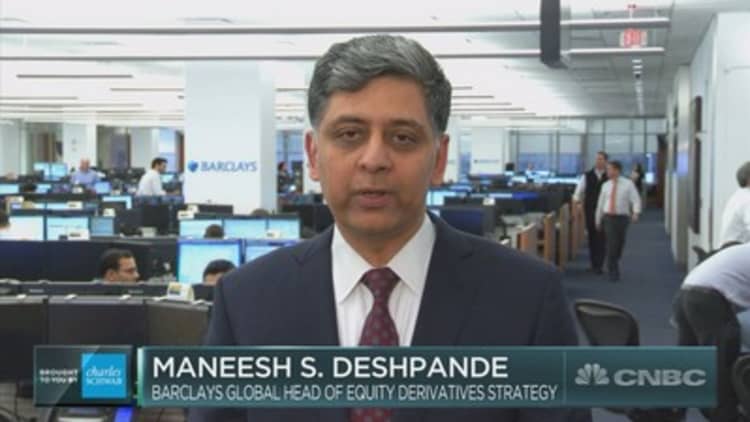Market volatility is here to stay, prompting many financial advisors to warn investors, "Don't go to cash."
But you may already have a significant amount of money not in the markets. That's not necessarily a bad thing, as long as you handle it wisely.
High-net-worth households keep 27.3 percent of their portfolios in cash or cash equivalents, according to the Capgemini World Wealth Report published last year. That is sandwiched between 31.1 percent held in equities and 18 percent in fixed income, according to the report.
Research shows that having stores of cash can increase happiness. A study published last year found that individuals with more liquid wealth reported that they have more life satisfaction.
"If that makes the client feel confident that when the market goes down, 'I still have this amount that's just liquidity,' there's actually a tremendous value," said Michael Halloran, head of business development and partnerships at MaxMyInterest, an online platform that aims to help investors get higher yields on their cash.
"If they're happy that they're not feeling anxious, then they can tolerate greater fluctuations in the portfolio," Halloran said.
Millennials, who entered the market around the time of the financial crisis, typically hold a lot of cash, Halloran said. Baby boomers, who still suffer from jitters from that downturn, also like to keep liquid funds close by, according to financial advisors.
Experts typically recommend that individuals keep three to six months' expenses in an emergency fund. If you're particularly risk averse, or it would take more time to replace your income, you may want to put away even more.

How to best store those funds, while still earning interest on those sums, can vary.
MaxMyInterest works to connect your bank accounts together to find the best rates for your cash. The highest rate the company currently offers is around 1.61 percent, with online banks typically providing the highest rates, according to Halloran. MaxMyInterest does not require a minimum balance to invest and charges .02 percent per quarter on the cash it manages.
Investors who decide to go it alone should look to online savings accounts for yield, according to Ken Tumin, founding editor of bank account comparison website DepositAccounts.com. Those accounts are FDIC insured (meaning losses up to $250,000 are covered), and typically respond quicker to Federal Reserve rate hikes than brick-and-mortar banks, Tumin said.
Another riskier option is money market funds offered through a brokerage account, according to Tumin. Those funds also respond quickly to Fed rate hikes, but don't provide FDIC insurance. It is important to note that they are not the same as money market accounts, a type of savings account, Tumin said.
High-yield checking accounts provide yet another alternative. These accounts work by offering a certain yield up to a specific limit. For example, the account may offer a 3 percent return up to $10,000, while anything above that gets a lower yield. Those accounts usually come with certain rules, such as a required number of debit card transactions per month, Tumin said.
Certificates of deposit typically offer a higher yield than savings accounts, but the downside is that you will face early withdrawal penalties if you need the money in a pinch, he said.
You may also want to park your cash in a post-tax Roth IRA, Tumin said, particularly if having an emergency fund will put a dent in your ability to save for retirement. But keep in mind that while you can withdraw contributions without incurring a tax penalty, the same does not go for any gains on the investments.
"I would consider that a last resort," Tumin said. "It would be much better to do a bank account or savings account approach for your emergency fund."
Financial advisors who work to get investors' money off the sidelines offer another recommendation: Bonds.
"Right now, with what's happening with the Fed raising rates, opportunities are starting to sprout where you don't have to take a lot of risk," said Matt Dalton, CEO and CIO at Belle Haven Investments in Rye Brook, New York.
That includes the two-year Treasury, which currently has a yield above 2 percent.
"That's pretty secure, and most people can see out two years," Dalton said.
If the funds you're investing are earmarked for emergencies, you will want a shorter duration, such as the 30-day or 90-day Treasury bills, he said.
"Because the maturity is so short, you don't have a lot of risk of losing any principal," Dalton said.
If you do have to sell earlier, "it would be no worse than a transaction fee," he said.
More from Personal Finance:
Your bitcoin may be lost for good if you die without a plan for it
What the tax pros say you should do before heading their way
Justice Department announces charges in $500 million senior fraud schemes


